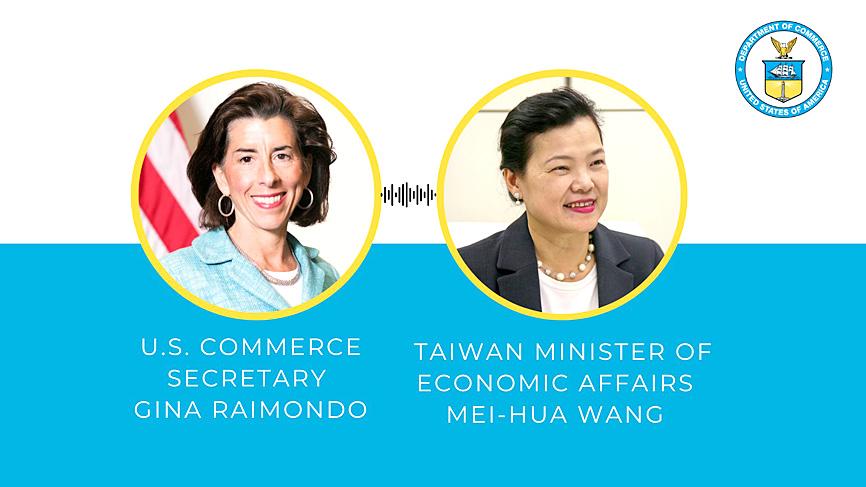Taiwan and the US have established a new bilateral cooperation framework to develop commercial programs and strengthen critical technology supply chains.
Called the Technology Trade and Investment Collaboration (TTIC), it is also to focus on promoting a two-way investment environment, studying industry trends, and exploring new opportunities and investment in the US market, a US Department of Commerce news release said.
The two sides are to designate representatives at the bureau level to plan and convene the first meeting of the TTIC in the coming months, the statement said, while providing few other details about the framework’s functions.

Photo: screen grab from Twitter
Taiwan and the US already communicate on economic issues through two other high-level bilateral economic dialogue platforms — the Trade and Investment Framework Agreement and the US-Taiwan Economic Prosperity Partnership Dialogue.
The forming of the mechanism was announced during an online meeting between Minister of Economic Affairs Wang Mei-hua (王美花) and US Secretary of Commerce Gina Raimondo early yesterday.
During the meeting, Raimondo reiterated Washington’s support for Taipei, and the importance of the bilateral US-Taiwan commercial and investment relationship.
She also expressed the US’ continued interest in working together with Taiwan on issues of common commercial concern, particularly in the area of semiconductor supply chains and related ecosystems, the statement said.
The US has repeatedly pressed Taiwan, as a major chip producer, to do more to help resolve a global shortage of semiconductors, which has shuttered some auto production lines and impacted consumer goods.
Taiwan says it is doing all it can to help.
Taiwan and the US are long-term and reliable supply chain partners, Wang said.
The new framework would help Taiwanese and US companies work closer to promote two-way investment and trade to further deepen the already strong relations between the two nations, Wang was quoted as saying in a statement.
Taiwan also hopes to further work with the US on infrastructure in third nations and in helping Taiwanese firms participate in US President Joe Biden’s “Build Back Better” plan, she said.
Additional reporting by Reuters

AGING: As of last month, people aged 65 or older accounted for 20.06 percent of the total population and the number of couples who got married fell by 18,685 from 2024 Taiwan has surpassed South Korea as the country least willing to have children, with an annual crude birthrate of 4.62 per 1,000 people, Ministry of the Interior data showed yesterday. The nation was previously ranked the second-lowest country in terms of total fertility rate, or the average number of children a woman has in her lifetime. However, South Korea’s fertility rate began to recover from 2023, with total fertility rate rising from 0.72 and estimated to reach 0.82 to 0.85 by last year, and the crude birthrate projected at 6.7 per 1,000 people. Japan’s crude birthrate was projected to fall below six,

Conflict with Taiwan could leave China with “massive economic disruption, catastrophic military losses, significant social unrest, and devastating sanctions,” a US think tank said in a report released on Monday. The German Marshall Fund released a report titled If China Attacks Taiwan: The Consequences for China of “Minor Conflict” and “Major War” Scenarios. The report details the “massive” economic, military, social and international costs to China in the event of a minor conflict or major war with Taiwan, estimating that the Chinese People’s Liberation Army (PLA) could sustain losses of more than half of its active-duty ground forces, including 100,000 troops. Understanding Chinese

US President Donald Trump in an interview with the New York Times published on Thursday said that “it’s up to” Chinese President Xi Jinping (習近平) what China does on Taiwan, but that he would be “very unhappy” with a change in the “status quo.” “He [Xi] considers it to be a part of China, and that’s up to him what he’s going to be doing, but I’ve expressed to him that I would be very unhappy if he did that, and I don’t think he’ll do that. I hope he doesn’t do that,” Trump said. Trump made the comments in the context

SELF-DEFENSE: Tokyo has accelerated its spending goal and its defense minister said the nation needs to discuss whether it should develop nuclear-powered submarines China is ramping up objections to what it sees as Japan’s desire to acquire nuclear weapons, despite Tokyo’s longstanding renunciation of such arms, deepening another fissure in the two neighbors’ increasingly tense ties. In what appears to be a concerted effort, China’s foreign and defense ministries issued statements on Thursday condemning alleged remilitarism efforts by Tokyo. The remarks came as two of the country’s top think tanks jointly issued a 29-page report framing actions by “right-wing forces” in Japan as posing a “serious threat” to world peace. While that report did not define “right-wing forces,” the Chinese Ministry of Foreign Affairs was